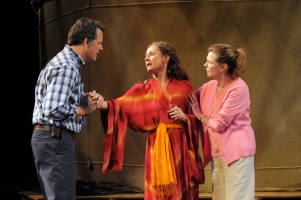ACT's Vital 'Quality' Offers Life, Death, Hippies and Jesus
(c) The Examiner
November 1, 2008
By Chad Jones
A savvy TV writer turned playwright, Anderson understands the science of dialogue and how familiar rhythms can lull an audience into that comfortable, in-front-of-the-TV feeling. When the play starts, we're in the Ohio living room of grieving parents Bill (Steven Culp) and Dinah (JoBeth Williams). He's reading the paper; she's knitting. And they're trying not to talk about the violent death of their only child, a college-age daughter. From the comfy confines of a Midwestern home, Anderson takes us to the burnt-out Oakland hills and the ruins of what was, for several decades, the home of Dinah's cousin Jeannette (Laurie Metcalf) and her husband, Neil (Dennis Boutsikaris). Rather than relocate or rebuild, Jeannette and Neil have chosen to live amid the ashes in a yurt, a Mongolian-designed tent, and to install solar panels that run their computers and their makeshift outdoor kitchen. Household items destroyed in the fire now hang from the dead trees like modern art – melted aluminum window frames, stained glass-like melted bottles, etc. – and for personal needs, there's a composting outhouse and a claw-foot tub for cleansing soaks. Jeannette, a poet, and Neil, a socio-cultural anthropology professor, are attempting to exist in a post-disaster paradise of sorts, but there are two major intrusions. One is that Neil's cancer, which began in the prostate, has spread, and he is now in the final stages of a painful illness. The other is a well-intentioned but awkward visit from the Ohio relatives. Anderson's structure is, at first, easy to assess: we've got "godless, self-serving liberals," a variety of which is not uncommon in the Bay Area, and we've got born-again Christians from the Bible Belt. Ready, set, clash! When the topic of conversation turns to issues of faith, drugs or evolution, we get standard-issue responses from both sides. But Anderson is a smart writer who allows her characters dimension beyond dogma, and soon the interactions are deeply personal and guided by rage, fear, grief and doubt. The two-hour play—unfolding on a beautifully detailed, realistic set by Donald Eastman -- builds undeniable momentum. Act 1 ends with a shocker, and Act 2 jumps right into a powerful life-and-death intensity. There's ample humor along the way, especially when Dinah tries her first hit of pot, but make no mistake. This is pure drama. Where Anderson stumbles is at the end, or maybe I should say ends, plural. She doesn't know how to conclude the play, so she does it about three times, never quite successfully. If the play, produced in association with the Geffen Playhouse, which hosted the play's premiere last year in Los Angeles, and Jonathan Reinis Productions, is going to head, as rumored, to New York, the end must be addressed. Neil delivers a final, fascinating lecture, but it's hard not to think about the late Randy Pausch, and his bestselling book, "The Last Lecture." And the two scenes that follow don't have the emotional impact a play this emotionally alive deserves. "The Quality of Life," for all its assets as a powerful play, is also a showcase for some incredible actors giving performances so natural, so powerfully connected to one another that they can make you forget you're watching actors famous for being on TV. Metcalf's hip, artsy Jeannette never lets you forget her Midwestern roots, even though she herself might want to. Her connection with Boutsikaris' Neil, a brilliant, affable man trying to make peace with mortality, is profound. This couple's deep love is key to the plot and offers the play's greatest emotional touchstone. Culp has the toughest role as the righteous, rather narrow-minded Bill, who foists his god on anyone he feels might be on the wrong path, which, of course, Neil and Jeannette are. But rather than come off as a brain dead stiff who spouts the God line, Culp's Bill is clearly guided in his spiritual rigor by the loss of his child and a grief so debilitating he likely couldn't move without the lifeline of faith. And then there's Williams' Dinah, who made my heart ache. Because Dinah is a kind woman who has devoted herself to family, she could be easily dismissed as a robo-homemaker or a Jesus freak who could use a dose of enlightenment and women's lib. But Dinah is bright, empathetic, nurturing and impossible to dismiss. She has a sense of humor, a sense of adventure and a clear enough sense of her life to know people like Jeannette and Neil might find her ridiculous or, worse, boring. Her connection to God isn't nearly as sure as her husband's, and she's got far too much life left in her to let the waves of grief that submerge her completely pull her under. Dinah is a strong, beautiful woman. We recognize her and love her, and that's one of the reasons the ending is dissatisfying: it shortchanges Dinah's emotional journey. Everyone in this four-hander pulls his or her emotional weight, and even with its muddled ending (s), "The Quality of Life" is a rich, satisfying theater experience that engages the head and especially the heart. |
DISCLAIMER: This site is a Steven Culp fan site and is not affiliated with Steven Culp, his family or any of his representatives.
Unless otherwise noted, all captures were made by me from videos from various sources. All shows and photos belong to their respective owners.
NO COPYRIGHT INFRINGEMENT INTENDED!
© 2004-2022 SConTV.com and Steven-Culp.com
Unless otherwise noted, all captures were made by me from videos from various sources. All shows and photos belong to their respective owners.
NO COPYRIGHT INFRINGEMENT INTENDED!
© 2004-2022 SConTV.com and Steven-Culp.com
